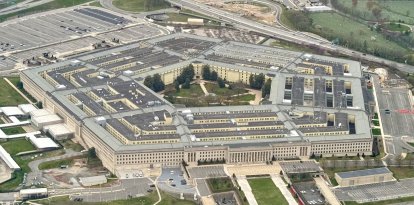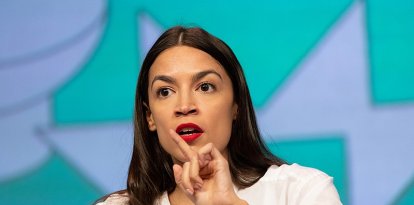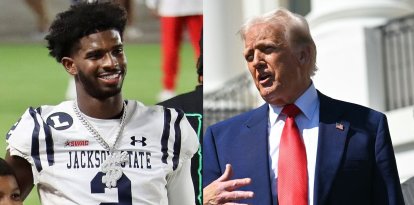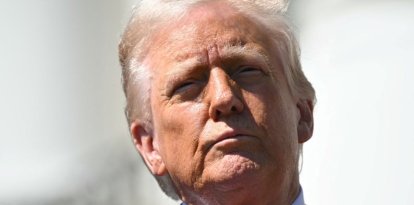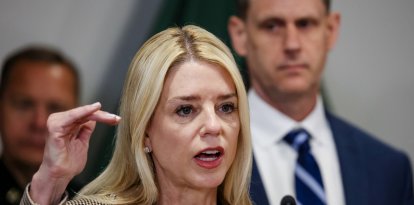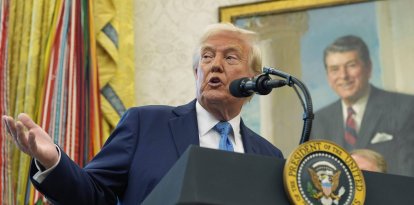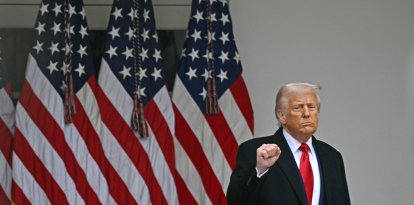Doug Burgum's strategy for the Republican debate: First, name recognition, then, his agenda
The governor of North Dakota will arrive on August 23 as one of the most unknown candidates. He is looking to use the debate to remedy that situation and boost his campaign.
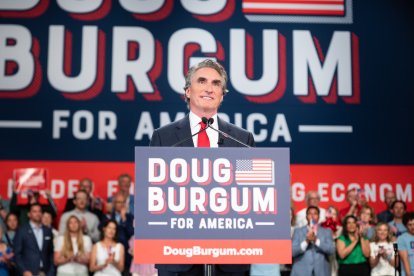
Doug for America
When Joe Biden won the 2020 presidential election, 22 of the 50 states had produced at least one president. Virginia, Ohio and New York lead the ranking and contrast with many states who have not produced any contenders to reside at 1600 Pennsylvania Avenue. For the 2024 elections, Doug Burgum seeks to add North Dakota to the aforementioned list but to achieve that, he must first overcome the Republican primaries and then accumulate 270 electors.
In order of priorities, he must first outmaneuver the rest of his Republican rivals to earn the right to possibly face Biden in November 2024. After qualifying for the first debate, scheduled for August 23, the Republican candidate is very clear about his strategy: the first order of business is name recognition and then he can move on to his agenda.
"Doug who?"
In an interview with POLITICO, Burgum talked about his origins, his unlikely victory in the 2016 elections and how he plans to stand out among figures such as Ron DeSantis, Tim Scott and Mike Pence, who enjoy much more support among Republican voters.
Burgum qualified for the debate by exploiting the rules imposed by the Republican National Committee (RNC). To meet the requirement of 40,000 individual donors, he used his personal fortune to give a $20 gift card to all those who contributed a dollar to his campaign.
Once on stage, he will dedicate himself to solving his name recognition problem, which he assumes with total sincerity. He talked about solving the "Doug who?" question so that he could inform the audience on his three-point policy platform: economy, national security and energy.
"Innovation has always been America's best weapon. Innovation over regulation is the way to solve the challenges we face today. Regulation looks backwards, and innovation looks to the future. It has provided an opportunity for a better life for Americans willing to achieve it. All that is now at risk," he said about the economy, for which he plans to use his experience as an entrepreneur.
"Don't worry; we're not going to win"
The Republican founded a successful software company in 1984, which he sold to Microsoft for $1.1 billion in 2001. Although he remained linked to the business sector, he practiced philanthropy with his newfound wealth, specifically introducing young people to available new technologies and thus helping them to be able to compete in the twenty-first century.
In 2016 he decided to jump into politics, although he was clear that he would not be obsessed with winning a position. He wanted an executive role, which would allow him to deploy his knowledge of the private sector in the public sector. Although his wife was not convinced of the gubernatorial election, Burgum reassured her with a "don't worry, we're not going to win."
Early polls put him 49 percentage points behind his rival, who happened to be North Dakota's attorney general. Burgum's fortune and campaign to travel throughout the state allowed him to surprisingly reverse the situation, prevailing in the primaries and then in the generals.
Returning to his agenda, the candidate believes energy is the second most crucial issue in this election. "We must stop buying energy from our enemies and start selling energy to our friends and allies. The United States produces cleaner and safer energy than anywhere else in the world. When the United States becomes truly energy independent and supports our allies, we avoid wars like the one Putin started in Ukraine. We stabilized the world and restored America as the leader of the free world," his website states.
Finally, the debate will give the Republican the attention needed to showcase his national security agenda, which is based on recognizing the real threats the United States faces today and unifying the country against Russia and China, the latter with whom Burgum claims that the US is currently involved in a cold war.
Although some describe him as a candidate for another era, the governor of North Dakota will try to convince voters to bring a resident of Arthur, ND, a small town of 300 residents, to the White House. "Not bad for a kid who grew up in a town where there was no computer. It's a story that's only possible in America," he said in the interview with POLITICO.
RECOMMENDATION
